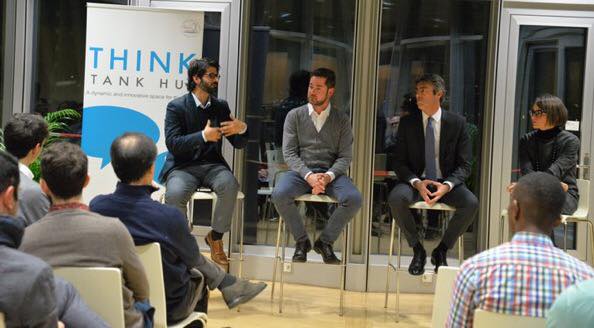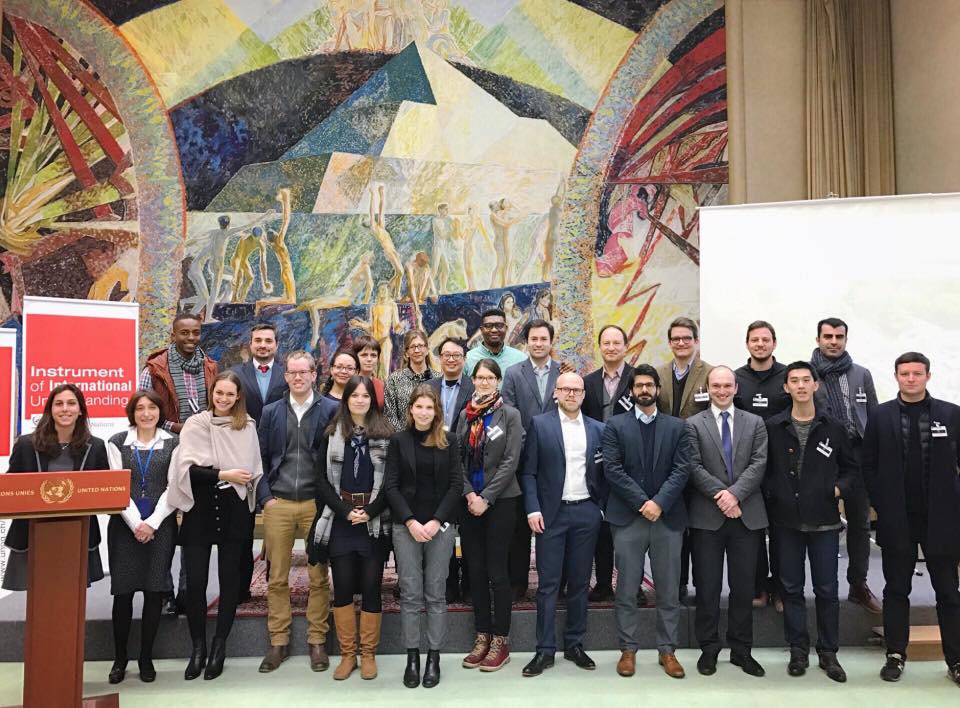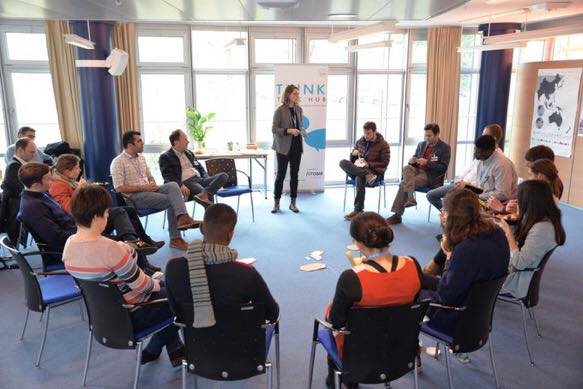On Think Tanks, in partnership with foraus, The Think Tank Hub in Geneva and the Swiss Federal Department of Foreign Affairs (FDFA), organised the first WinterSchool for Thinktankers. The venue was the city of Geneva – specifically, International Geneva.
The idea of the School for Thinktankers was first developed by On Think Tanks in 2014. It was designed to inform and inspire future think tank leaders, and as an opportunity for participants to learn about the various aspects of think tanking directly from practitioners.
Establishing the partnership
The partnership between On Think Tanks, foraus, the Think Tank Hub and the FDFA began on November 2015 on the sidelines of a meeting of think tanks at the Graduate Institute in Geneva. The partners saw the need to develop the next generation of think tanks- and the Think Tank Hub offered a great vehicle for it. After a year of planning, the first WinterSchool for Thinktankers was launched in October 2016.
Programme and activities
The WinterSchool 2017 was held on 22-28th January in various locations in the heart of International Geneva. Venues included the Think Tank Hub (with its offices in the WMO building), the UN Library, the Geneva Press Club and the Graduate Institute. These settings offered participants a unique take on life as international policy thinktankers in a global city.
The outline covered five key topics through lectures and visits:
- Day 1 was an introductory day in which participants explored the think tank label and its development;
- Day 2 was dedicated to policy relevant research;
- Day 3 covered research communication;
- Day 4: focused on M&E of think tanks (both for management and for influence);
- Day 5 explored funding models, fundraising and financial management; and
- Day 6 focused on governance and management of think tanks.
- Day 7 was dedicated to reflecting on the lessons learned through the week.
The sessions were complemented by a city tour, a welcome cocktail and panel, and group outings during the evening. These social events provided the space for participants to engage with each other and learn about and from their peers.

Panel at the welcome cocktail with UNO Library Director and Swiss Ambassador to the UN
Participants
The 15 participants came from 12 different countries: Mexico, Brazil, Britain, Belgium, Germany, Switzerland, Austria, Ukraine, Nigeria, South Africa, Iran and China, and all had diverse roles within their organisations.
- Mathias Bonk, global health expert
- Luca Flurin Brunner, Community manager at foraus
- Gabriel Farfán Mares, think tank entrepreneur
- David Gomez-Alvarez, visiting scholar at MIT, think tank entrepreneur, and former public servant in Mexico
- Russell Harrigan, think tank entrepreneur at the British Virgin Islands
- Adrian Hartmann, works at the Christian Solidarity International Switzerland, a human rights organisation
- Makhele Letlhogonolo, graduate student in public health
- Jon Nash, technology entrepreneur
- Tobore Oru, economics doctoral student in Grenoble
- Halyna Pastukh, works at Data Journalism Agency NGO in Ukraine
- João Pedro Pompeu Melhado, works at Endeavor Think Tank
- Shanchuan Qiu, student at the Graduate Institute of Geneva
- Mehdi Shiva, Phd Student

Participants and team at the UN Library.
Speakers
The final list of speakers included:
- Thomas Biersteker, Director of policy research at the Graduate Institute Geneva
- Catherine Fiankan-Bokonga, Correspondent journalist for the United Nations Office and vice president of the Geneva Press Club
- Jenifer Freedman, Chief of communications and outreach, results and evaluation at the United Nations Research Institute for Social Development (UNRISD)
- Thomas Guerber, Director at DCAF
- Katinka Koke, Associate programme officer at UNITAR
- Yan Luong, Deputy Director of foraus and head of the Think Tank Hub; former digital communications manager at the ICRC
- Enrique Mendizabal, Founder and director at On Think Tanks
- Laura Merrill, IISD
- Alexandre Munafò, Interpeace
- Verena Parzer-Epp, Director of communications at Avenir Suisse
- Emilia Pasquier, Director of foraus
- Will Paxton, Director of KIVU International
- Francesco Pisano, Director of the Library of the United Nations Office in Geneva
- Johan Rochel, Board member of foraus
- Dr. Marc-André Pradervand, Head of direct marketing & donor care at Médecins Sans Frontières (MSF) in Geneva
- Andrea von Siebenthal, Communication manager at the Geneva International Center for Humanitarian Demining (GICHD)
- Sonja Stojanovic Gajic, Director of the Belgrade Centre for Security Policy
- Philippe Stoll, Deputy head of public communication at the International Committee of the Red Cross (ICRC) in Geneva
- Kali Taylor, IISD; co-founder and executive director of Student Energy
- Benjamin Tyler Smith, Knowledge management officer at Green Growth Knowledge Platform
- Stephen Yeo, former executive director at the Centre for Economic Policy Research
 Learning about foraus, a grassroots foreign policy think tank
Learning about foraus, a grassroots foreign policy think tank
What did we learn in the first WinterSchool for Thinktankers?
The concept of a traditional think tank is contentious. The experiences of British political think tanks like IPPR were in clear contrast to those of international development think tanks, like IISD in Geneva. The model of foraus is quite unique as well: a bottom-to-top think tank supported by the engagement of a large network of volunteers.
We also learned that thinktankers are a mixed group. The idea of the typical thinktanker- the policy wonk- is based, much like the idea of the ‘typical think tank’, on idealised models. Many think of a thinktanker as an academic with little patience for teaching and an eye on hard-nosed policy analysis. However, think tanks have become attractive vehicles for policy entrepreneurs of all kinds, and the traditional model is changing to accommodate these diverse experiences.
Consequently, the WinterSchool had to adapt to and feed into the different agendas and interests of the participants. This was achieved through discussions, group reflection and by facilitated an honest exchange between participants, speakers and the WinterSchool team.
The visits, speakers and environment give prospective think tank leaders an opportunity to imagine themselves in the shoes of leading thinktankers, and Geneva offers a unique opportunity for those with a clear interest in shaping global policies and agendas (such as the Agenda 2030).
Feedback from participants suggested that the WinterSchool was of great value to them, but without meaningful follow-up the lessons and skills learned in Geneva will be short-lived. We will therefore work hard to develop both general follow-up support for all the participants and more specific engagement for those with ongoing projects and efforts to develop or lead a think tank.
Support in the future will include
- Access to the OTT School Courses
- Access to an online platform to connect with future participants as well as with the team
- Support in sharing their plans to a wider audience
Interested in attending a future edition of the School for Thinktankers? Click here for more information on when the next edition will be.

